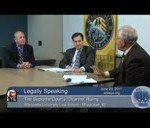Bullcoming Arrives, But Where’s the Path?
 The Supreme Court continues to refurnish the modern courtroom with eighteenth-century antiques. Without the slightest glint of irony, or even humor, the Court assessed the admissibility of twenty-first century scientific evidence using legal doctrine crafted on parchment with quill pens in an age when mirrors were placed to direct sunlight into the face of the accused at trial. (Why the mirrors at a time when the accused could not testify in his defense anyway? That’s another story.)
The Supreme Court continues to refurnish the modern courtroom with eighteenth-century antiques. Without the slightest glint of irony, or even humor, the Court assessed the admissibility of twenty-first century scientific evidence using legal doctrine crafted on parchment with quill pens in an age when mirrors were placed to direct sunlight into the face of the accused at trial. (Why the mirrors at a time when the accused could not testify in his defense anyway? That’s another story.)
In its June 23, 2011 decision in Bullcoming v. New Mexico http://www.supremecourt.gov/opinions/10pdf/09-10876.pdf the Supreme Court once again addressed the admissibility against the accused of lab reports prepared by analysts who do not testify at trial. The report was offered through a “surrogate witness.” Bullcoming was charged with drunken driving. A blood test pegged his BAC at 0.21, “an inordinately high level,” as the Court helpfully observed. At trial, however, the State did not call as a witness “Caylor,” the lab analyst who measured the BAC. Caylor, it seems, was enjoying an “unpaid leave for a reason not revealed” – always an intriguing “uh oh” when assessing credibility. Instead, the State called another lab “scientist” who had not observed Caylor’s testing of Bullcoming’s sample but who could talk about lab procedures and the reliability of the report in general. The Court tells us that a “startled defense counsel” objected. (N.B. How the Court knew she was “startled” is unclear, but it is abundantly clear that the confrontation right requires only a timely objection by counsel, startled or unstartled.)


 This week, the US Supreme Court handed down a decision in Turner v. Rogers, a case involving a non-custodial parent who was jailed for nonpayment of child support. Failure to pay child support is a violation of a court order to pay, and is thus handled as a civil contempt of court case. A finding of civil contempt in these cases is predicated on nonpayment when the defendant is financially capable of paying, and a defendant can always avoid jail time by either paying the amount owed, or by showing that he is incapable of paying. Turner had been ordered to pay $51.73 per week for the support of his child and had been sentenced to jail time on several previous occasions for failure to pay. He was not represented by counsel at the hearing where he received a 12-month sentence, which he served in its entirety. At the hearing in question, the judge sentenced Turner without making an express finding that Turner was financially capable of paying the support owed. On appeal, Turner argued that the US Constitution entitled him to counsel at his hearing because, although the contempt proceeding is civil in nature, the potential for incarceration triggered a Due Process Clause-based right to be represented. Although Supreme Court cases have consistently found that the Sixth Amendment right to counsel in criminal cases does not apply to civil cases (not even civil contempt cases), there was a split in the circuits over whether a defendant has a right to counsel under the Due Process clause in civil contempt proceedings enforcing child support orders.
This week, the US Supreme Court handed down a decision in Turner v. Rogers, a case involving a non-custodial parent who was jailed for nonpayment of child support. Failure to pay child support is a violation of a court order to pay, and is thus handled as a civil contempt of court case. A finding of civil contempt in these cases is predicated on nonpayment when the defendant is financially capable of paying, and a defendant can always avoid jail time by either paying the amount owed, or by showing that he is incapable of paying. Turner had been ordered to pay $51.73 per week for the support of his child and had been sentenced to jail time on several previous occasions for failure to pay. He was not represented by counsel at the hearing where he received a 12-month sentence, which he served in its entirety. At the hearing in question, the judge sentenced Turner without making an express finding that Turner was financially capable of paying the support owed. On appeal, Turner argued that the US Constitution entitled him to counsel at his hearing because, although the contempt proceeding is civil in nature, the potential for incarceration triggered a Due Process Clause-based right to be represented. Although Supreme Court cases have consistently found that the Sixth Amendment right to counsel in criminal cases does not apply to civil cases (not even civil contempt cases), there was a split in the circuits over whether a defendant has a right to counsel under the Due Process clause in civil contempt proceedings enforcing child support orders.